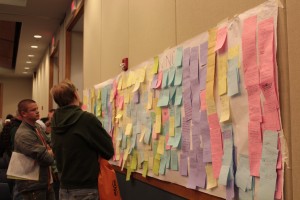Almost 170 community members attended the March 18 meeting at the Transylvania County Public Library to discuss the Nantahala-Pisgah National Forests Land Management Plan revisions. The meeting is the next-to-last in a series of six taking place in each of the Nantahala-Pisgah Ranger Districts. Each meeting is open to the public and goes from 6 p.m. to 9 p.m.
Rangers had participants write notes on two pieces of paper and attach them to a board. The first piece outlined how community members benefit from the national forests and was placed under the “Me” section. The second paper, posted on the “WNC” side of the board, included how members thought the forests benefit all of Western North Carolina.
From there, rangers will take the input and create an assessment report. The report will also contain an assessment of the current state of the forests.
The assessments will be used in the first phase of the plan revision. The revision process will contain three phases: The first and current phase is a collection and assessment of public opinion and information. A report of the assessments will be available by the end of September. The second phase will involve identifying the changes that will need to take place. The final phase will result in a developed plan, focusing on the changes that will be implemented. The entire process is set to be completed in 2015.
The current plan was set in place in 1987. The last revision was completed in 1994.
Members from the community had the chance to voice in front of an audience and to the park rangers their concerns about the state of the forests.
“I feel like everyone’s trying to encroach on our hunting,” one man said.
“I do think there’s a place in our forest for everything. . .We just have to come together,” said another.
Toward the end of the meeting, participants were free to browse poster boards outlining issues within the park. Boards ranged from discussing vegetation management to subsurface mineral ownership.
Community members strongly voiced their opinions and were active in discussing the fate of their homelands.
“Thank you. Thank you for asking us,” said community member David Duggins.



